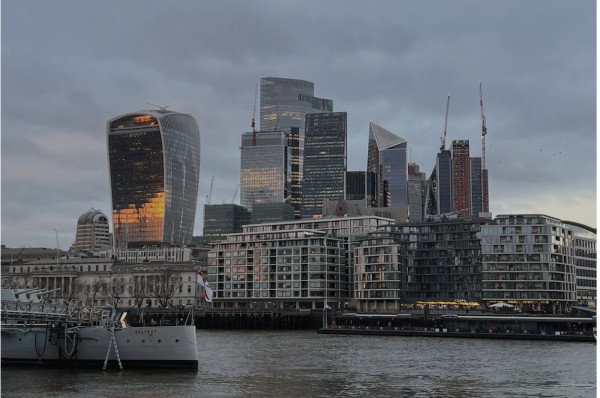

Global markets could be in a "calm before the storm" fund managers have claimed, although there are bright patches on the investment horizon.
Speaking in a webinar, Anthony Wills and fellow investment manager Scott Spencer, from the Columbia Threadneedle multi-manager team, said there was a "lot going on".
Wills said: "Geopolitics remains uncertain and there’s a lot going on. It feels maybe this is the calm before the storm.
"At the moment it seems corporate earnings data is holding up okay so far, and companies are good at beating expectations.
"However, we are watching closely to see what sort of consequences will be caused by the aggressive hiking cycle from the central banks have consequences.
"I would be very surprised if we do not see further issues."
The managers were providing a quarterly update on January-March 2023, a period which saw the demise of Silicon Valley Bank and Credit Suisse - events which shook markets and caused sentiment to turn more negative.
Nigel Green, chief executive of the deVere Group, commented: "This huge disconnect between stocks and bonds suggests that investors should brace themselves for significant volatility in global financial markets over the next few weeks.
"We could see a 10 per cent correction.
“We expect that we’re currently in the ‘calm before the storm’ phase."
Green added that a market correction is a natural part of the market cycle and can present major buying opportunities for long-term investors who are willing to weather short-term volatility.
Indeed, consensus forecasts of a "gloomy earnings season" have also rocked the ship, with McDonalds forecasting a recession.
Better-than-expected
However, there have been stronger-than-expected results from giants such as Alphabet, Google and Microsoft.
Moreover, as the GfK confidence indicator showed in April, sentiment around the general UK economy has improved significantly over the past four months.
According to Joe Staton, client strategy director of GfK: "The brighter views on what the general economy has in store for us, with April’s six-point rise cementing a 20-point improvement since January, could even be seen as the proverbial ‘green shoots of recovery’."
But while the CT multi-manager team said it was being more "cautious in our positioning overall", there were many areas where they had seen opportunities to position portfolios in the Navigator and Lifestyle ranges.
The team highlighted how allocations in the fourth quarter of 2022 towards fixed income had helped shore up performance while keeping the funds within their "expected volatility" in each strategy.

Spencer said that, within the Navigator range, there has been a strong bounce-back in the three years post-Covid.
Despite the market turmoil around contagion and consensus expectations of a US recession", in general, equity allocations had done well (see chart).
Moreover, Wills said the feared contagion over SVB and Credit Suisse had not materialised.
He explained: "When we think about UK banks they are probably in a better place than US banks. In the US, cross-party policy change in the Trump administration loosened regulations on the smaller banks, such as SVB.
"So in terms of regulation, US banks are in a worse place than UK or European banks. Moreover, capital ratios are still high in the UK - although there there is some chatter around commercial real estate, and there are a lot of empty office blocks.
"However, I think UK and European banks are far better placed this time around with far less leverage and higher capital ratios."
Allocation strategy
"Cash is investible once again", Scott commented, with money market funds experiencing strong inflows over the first quarter to the end of March.
But while bond allocations had done well thanks to central banks raising rates, he warned there are "consequences" to interest rate rises, whether this is in regard to bank lending
Spencer said: "Across bond markets, there has been huge volatility so far this year, and we remain cautious in our positioning.
"Aggressive rate hikes will inevitably cause accidents and unintended consequences and it can take time for the effects of rate hikes to be fed into the wider economy.
"But our base case is that we are cautious, not bearish."

During Q1, he said the team had been reducing some equity positioning and taking some profits in the credit positions they had at the start of the year, to be able to back managers they have "historically invested with."
These include Man GLG Asia ex-Japan, for both Navigator and Lifestyle funds, and Premier Miton UK Value Opportunities, run by Matthew Tillett.
The team also introduced iShares Physical Gold for some of the more cautious portfolios. "Given the macro backdrop, we have bought some financial assets", Spencer added.
Calmer skies ahead
Lothar Mentel, chief investment officer for Tatton, agreed there were calmer skies ahead.
In his latest update, he said: "If markets have calmed down after March’s mini global banking crisis, it seems that the global political environment has also become more serene.
"The western world’s central banks are still telling us interest rates will remain high because of inflation, but Tesco cut the price of milk.
"Compared to last year, the western world’s retail prices are 5-7 per cent higher but, in Germany, prices between producers and wholesalers are now only about 2 per cent higher than last year.
"In Asia, prices are not rising discernibly. Indeed, China’s producer prices are 2.5 per cent below last year’s level."
However, he admitted it would be "foolish" to predict things will not become turbulent into the summer, adding: "Until central banks are comfortable headline inflation no longer poses a threat, destabilising bankruptcies remain a strong possibility.
"But to give central bankers their due, they have yet to induce recession despite the talk for the past year.
"Perhaps they can engineer a soft landing for the economy after all, by way of a return to lower, less damaging interest rates while inducing a less risk-averse attitude from banks and other sources of corporate credit towards borrowers."
simoney.kyriakou@ft.com



